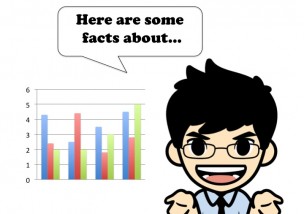
英語のプレゼンをする機会は、特に外資系の仕事でしたら一回は訪れると思います。その時、挨拶から始めますが、実はこれがとても重要なのです。例えるなら、100メートル走のスタート地点の様なものです。世界一速い男、ウサイン・ボルトもスタートが弱点と言われていました。しかし、彼もその弱点を克服するため、日々トレーニングを続けています。プレゼンの始まりも上手くできれば、後の内容からを述べる自身に繋がります。
英語のプレゼンは大抵、Hello, my name is~と挨拶をして、目的と内容を述べてから本題に入ると一般的に教えられていますが、果たしてどの様にしたらもっと自分らしい、満足の出来るスタートが切れるでしょうか?有名なプレゼンを観ると、挨拶はもちろんしていますが、それとほぼ同時に「つかみ」があります。そして、それによって自分も観客もプレゼンに入りやすくなります。
本日は、ネイティブ・スピーカーで異文化コミュニケーションの専門家(米・仏・日)である筆者が英語のプレゼンの挨拶に加え自分らしいスタートを切るための例文を60選紹介いたします。これらを使ってインパクトのある英語のプレゼンをしましょう!
よろしければ、こちらの二つの記事もどうぞ:
(4)Rhetorical question(修辞疑問)から始める英語のプレゼン
(1)手短な逸話から始める英語のプレゼン
・出だし
Let me tell you a (short/brief) story before my presentation.
「プレゼンの前に(手短くな)話しをしますね。」
I’d like to tell you a (short/brief) story that happened to me (a few weeks ago).
「(何週間か前に)、私に起きた出来事を(手短く)話したいと思います。」
Did I ever tell you about the time when (I got lost in Rome)?
Have I ever mentioned the time when (I got lost in Rome)?
「(ローマで迷子になった時)のお話をしましたっけ?」
I’ll never forget the time (I visited Italy)…
「(イタリアに観光で行った)時は忘れらません。」
Funny you would say/mention that, I was going to tell you about (that).
「それは奇遇な話ですね。たった今(それについて)話をするところでした。」
I remember the day when (my wife and I had coffee in Rome for the first time).
「(妻とローマで初めてコーヒーを飲んだ)日を今も覚えています。」
Have you ever (been to Rome)?
「(ローマには行った)ことはありますか?」
・背景を語る
One hot summer in 1997, I…
「1997年の暑い夏のことでした。私は〜」
I was on my way to (our client’s office), when…
「(クライアントのオフィス)に行く途中でした。」
Do you know (Alfredo’s Cafe in Rome)? Well, …
「(ローマにあるAlfredo’s Cafe)をご存知ですか?」
I’m sure you have all heard of (Alfredo’s Cafe in Rome).
「(ローマにあるAlfredo’s Cafe)をご存知だとは思いますが。」
I’m sure you (all) know (what a caffè freddo is). It’s (a type of Italian iced coffee).
「(カッフェ・フレッドは)ご存知だとは思います。(イタリアのアイスコーヒー)です。」
I’m not sure you all know (what a caffè freddo is) but (it’s a type of Italian iced coffee).
「(カッフェ・フレッドは)ご存知ないかもしれません、(イタリアのアイスコーヒー)です。」
・話を閉める
Anyways, long story short, (I never had such a great coffee in my life).
「手短に言えば、(あんな美味しいコーヒーは初めてでした)。」
The bottom line is, (I could never forget that taste).
「結論は、(あの味は忘れらない)ということです。」
In a nutshell, I wanted to say that (real Italian coffee is hard to find in Japan).
「きわめて簡潔に言えば、(日本で本格的なイタリアのコーヒーを見つけるのは難しいということです。)」
In the end, (I came back to Japan and I wanted to have that kind of coffee again).
「結果的に、(日本に帰ってきて、あのコーヒーをもう一度味わいたかったです)。」
Anyway, it turns out (we don’t have that in Japan).
「まあ(結果的に)、(日本にはその商品がない)ということが分かりました。」
So, the lesson I learned from that experience was (that)…
「つまり、その経験から学んだことは〜」
・プレゼンの内容に繋げる
So today, I would like to tell you about (our new coffee maker).
「ということで、本日は(我が社の新しいコーヒーメーカー)について語りたいと思います。」
So, in today’s presentation I would like to explain (how we can recreate that taste at home).
「ということで、本日のプレゼンでは、(あの味を家で楽しむ方法)を説明したいと思います。」
※explainの他にもdemonstrate、show you、tell youなどがあります。
Today’s presentation is about (how we can make that kind of coffee at home).
My presentation today will be about (how we can make that kind of coffee at home).
「本日のプレゼンは(あのコーヒーを家で作る方法)についてです。」
In today’s presentation, I will show you (how we can make a great caffè freddo at home).
「本日のプレゼンでは、(カッフェ・フレッドを家で作る方法)をお見せします。」
(2)格言から始める英語のプレゼン
“Information is not knowledge. ” Can you guess who said that?
“Information is not knowledge. ” Do you know who said that?
「”自然を深く観察せよ。そうするとすべてのことをより良く理解できるだろう”。誰の格言か分かりますか?」
Albert Einstein (once) said: “Information is not knowledge. “
「アインシュタインはこう言いました:”情報は、知識ではない”。」
I’d like to start with a quote from Albert Einstein. He said : “Information is not knowledge. “
「アインシュタインの格言から始めたいと思います。彼はこう言いました:”情報は、知識にあらず”。」
Did you know that Einstein said: “I have no special talent. I am only passionately curious.”
「アインシュタインが次のような格言を残しているのをご存知ですか?”自分には特別な才能なんてない。単に情熱的なまでに物事を知りたいだけだ”。」
Here is a quote from Albert Einstein: “The true sign of intelligence is not knowledge but imagination.”
「アインシュタインの格言です:”知性の本当の証しは、知識の量ではなく、想像力である”。」
(3)大胆な発言から始める英語のプレゼン
Let me be honest with you (for a moment). You can only (find the best coffee in Italy and nowhere else)!
「正直に言ってもいいですか?(世界一美味しいコーヒーがるのはイタリア)のみです!」
Truth be told, I hated/loved (going to school when I was a teenager)!
「本当のことを言います。(若い時は学校が)大っ嫌い/大好きでした!」
I gotta tell you, this country has the best (service) ever! And I’m from Japan!
「言わせてもらいますね。この国の(サービス)は最高ですね!日本出身の私が言うのですから!」
You know, where I come from, (people almost never shake hands).
「知ってるとは思いますが、私の国では(握手はあまりしないんですよ)。」
Ladies and Gentlemen, we have a problem! (Our business is in danger).
「皆様、問題が発生しました!(我々の企業が危ないです!)」
To me, nothing is more terrifying/exciting than bungee jumping. Except making a presentation!
「私にとって、バンジージャンプほど怖い/楽しいものはありません。プレゼンをする以外はね。」
Honestly speaking, I never understood why (people have to use their Smartphone while walking).
「本音を言うと、(スマホのながら歩きの意味が)理解できません。」
(4)Rhetorical question(修辞疑問)から始める英語のプレゼン
People often look up when they lie. Why? It’s because…
「人は嘘をつくと上を見ます。なぜか?それは。。。」
Have you ever wondered why (people shake hands)? It’s (a sign of trust/because…).
「何故(人は握手をするのか)疑問に思ったことはありますか?それは、〜」
How many people here are (studying English)? It’s not always easy, is it?
「この中で英語を勉強している方は何人いますか?苦労することはありますよね?」
What if I told you (there was an easy and fun way to improve your skills)?
「(スキルを上げる簡単で楽しい方法がある)と仮に言ったら?どう思いますか?」
If you had (all the time in the world), what would you do? Go on vacation? Or maybe stay home and relax?
「もし無限の自由時間を手にしたら、どう使いますか?旅行しますか?家でゆっくりしますか?
Let me ask you a question. (Does everyone like Broccoli)? Of course not!
「質問してもいいですか?(ブロッコリーは全員好きですか)?そんな訳ないですよね!」
How can you make sure (your skills improve)? I will answer that question in today’s presentation.
「どうしたら(スキルを確実に上げられるか)?本日のプレゼンでその質問にお答えします。」
(5)興味深い情報提供から始める英語のプレゼン
Did you know that (RE: in the email subject means “regarding” and not “reply”)?
「(メールの件名のRE:はReplyではなく、Regardingという意味だと)ご存知でした?」
Here are some facts about…
「〜についていくつか事実を紹介いたします。」
Before I get into the main topic, I have a few updates. First,…
「プレゼンの本題に入る前に、最新の情報があります。まず、〜」
I have a few things I’d like to show you before my presentation.
「プレゼンの前にいくつかお見せしたいことがあります。」
I have some interesting facts/information about…
「〜について面白い情報があります。」
(6)例えから始める英語のプレゼン
In my opinion, (learning a language) is very much like (sports).
「(語学はスポーツ)にすごく似ていると思います。」
Don’t you feel that (the world) is like (a giant stage) sometimes?
「(世界は大きなステージ)みたいな物だと感じませんか?」
(Life) is really like (a box of chocolate), isn’t it?
「(人生は本当にチョコレートの箱)みたいですよね?」
(Waiting for the results) was like watching water boil.
「(結果を待つ)のは(お湯が沸くのをじっと見ている)のと同じ感覚じゃないですか?」
Doesn’t (a 10-day vacation) sound/seem like (heaven)?
「(十日間の休みは夢の)様な話じゃないですか?」
(7)英語のプレゼンの挨拶の例
(1)~(6)の例文を組み合わせたりしてみてください。下記の二つの例を参考にしてみて、上記で紹介したフレーズが見分けられますか?
例その1:
Good morning everyone!
Did I ever tell you about the time when I didn’t know where my phone was and I panicked for no reason?
I was on my way to work when I realised it wasn’t in my bag and I panicked.
Anyway, it turns out I had left it at home. Don’t you feel silly when that happens?
So today, I would like to tell you about a method for people like myself who forget things easily.
皆さん、おはようございます!
私が携帯電話を無くしたと思って無駄にパニックをした話をしましたっけ?
会社に行く途中、バッグの中にないことに気づいてパニックになりました。
まあ、結果、家に忘れただけだったんですけどね。そいうのって恥ずかしいじゃないですか?
というわけで、本日は私のように忘れ物の多い人のためのメソッドを紹介したいと思います。
例その2:
In my opinion, preparing for a business trip overseas is very much like preparing for the Olympics. You can practice as much as you want but on the big day, you never know what is going to happen.
Good evening Ladies and Gentlemen, my name is Nash Mcleod and today, I would like to tell you about how to prepare effectively before your business trip to another country.
個人的に海外出張の準備はオリンピックに備えるのとものすごく似ていると思います。準備をいくらしても実戦では何が起きるか分かりません。
皆様こんにちは、ナッシュ・マクラウドともうします。本日は海外出張の前に万全の体制を作る方法をお教えいたします。
英語のプレゼンやスピーチをするにあたって、挨拶に本日紹介したフレーズを使えば自分らしいスタートが出来ると思います。コツはプレゼンのメインテーマにどの様に上手に繋げられかが重要です。
上手にプレゼンの挨拶が英語で出来ると、観客の注目を引きますし、自分の自信にも繋がります。すると、本題にも入りやすくなり、100メートル走のスタートの様に馬力がかかります!
勿論、一般に教えられている「挨拶をして、目的と内容を述べてから本題に入る」も宜しいですが、インパクトを与えたいのなら、自分に一番合った方法を上記から選んで個性のあるプレゼンの挨拶をしましょう!
こちらの英語のスピーチの準備に役立つ7のコツとフレーズでも紹介しています。是非、読んでみて下さい!
Thanks for reading and see you next time!
※このブログの内容は、読者の英語のレベルを問わず紹介されています。場面をイメージして、その場面に一番適したフレーズを覚えてみてください。すべてを覚える必要はありません。自分に一番合う表現や単語から始めてみてください。

